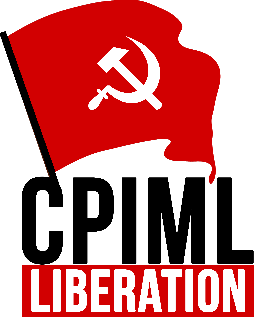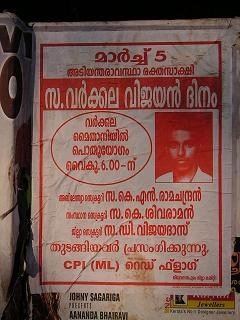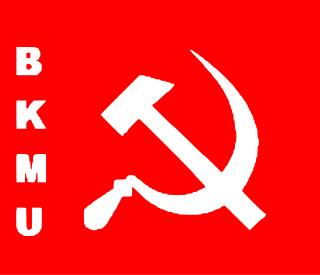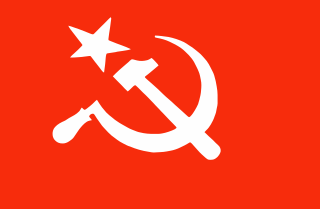
The Communist Party of India (Marxist) (abbreviated as CPI(M)) is a communist political party in India. It is the largest communist party in India in terms of membership and electoral seats, and one of the national parties of India. The party was founded through a splitting from CPI in 1964 and it quickly became the dominant fraction.

The Communist Party of India (CPI) is the oldest communist party in India. The CPI was founded in modern-day Kanpur on 26 December 1925. Currently, it has two members in Lok Sabha and two members in Rajya Sabha. In addition, it has 22 MLAs across four states and one MLC in Bihar. It has the current ECI status of a state party in Tamil Nadu, Kerala and Manipur.

The All India Forward Bloc is a left-wing nationalist political party in India. It emerged as a faction within the Indian National Congress in 1939, led by Subhas Chandra Bose. The party re-established as an independent political party after the independence of India. It has its main stronghold in West Bengal. The party's current Secretary-General is G. Devarajan. Veteran Indian politicians Sarat Chandra Bose and Chitta Basu had been the stalwarts of the party in independent India.
All India Coordination Committee of Communist Revolutionaries was formed in 1967 as a splinter group of Communist Party of India (Marxist), seeing its participation in the United Front government in West Bengal as a betrayal. Initially the group was known as AICCR of the CPI(M), and partially functioned as an inner-party fraction.

The Communist Party of India (Marxist–Leninist) Liberation is a communist political party in India. The party is represented in Bihar and Jharkhand Legislative Assemblies. Since 2023, the party is also a member of the INDIA electoral alliance.

Marxist Communist Party of India, MCPI was a political party in India that formed in 1983 under the leadership of Mohan Punamia. It emerged as a splinter group of Communist Party of India (Marxist) stuck to the original 1964 programme. The party general secretary was Jagjit Singh Lyallpuri.

Communist Party of India (Marxist–Leninist) Red Flag was formed in 1988 as a break-away from the Central Reorganisation Committee, CPI (ML).

Harkishan Singh Surjeet was an Indian Communist politician from Punjab, who served as the General Secretary of the Communist Party of India (Marxist) from 1992 to 2005 and was a member of the party's Polit Bureau from 1964 to 2008.

Bharatiya Khet Mazdoor Union literally 'Indian Land Workers Union' is a trade union of agricultural labourers in India. BKMU is politically tied to the Communist Party of India (CPI). BKMU is independent from both the main trade union central of CPI, the All India Trade Union Congress, as well as the farmers' organisation of CPI, the All India Kisan Sabha.

The Socialist Unity Centre of India (Communist) or SUCI(C) is an anti-revisionist Marxist-Leninist communist party in India. The party was founded by Shibdas Ghosh, Nihar Mukherjee and others in 1948.
Socialism in India is a political movement founded early in the 20th century, as a part of the broader movement to gain Indian independence from colonial rule. The movement grew quickly in popularity as it espoused the causes of India's farmers and labourers against the zamindars, the princely class and the landed gentry. After independence and until the early 1990s, socialism shaped some economic and social policies of the Indian government, although they mostly followed the principles of dirigisme. After this period, India moved towards a more market-based economy.
The Workers and Peasants Party (WPP) (also known as the Kirti Kisan Party) was a political party in India, which worked inside the Indian National Congress in 1925–1929. It became an important front organisation for the Communist Party of India and an influential force in the Bombay labour movement. The party was able to muster some success in making alliances with other left elements inside the Congress Party, amongst them Jawaharlal Nehru. However, as the Communist International entered its 'Third Period' phase, the communists deserted the WPP project. The WPP was wound up, as its leadership was arrested by the British authorities in March 1929.
Communism in India has existed as a social or political ideology as well as a political movement since at least as early as the 1920s. In its early years, communist ideology was harshly suppressed through legal prohibitions and criminal prosecutions. Eventually, communist parties became ensconced in national party politics, sprouting several political offshoots.
The All India Centre of Trade Unions is a trade union centre in India. It is the labour wing of the Marxist Communist Party of India (United). Previously it was the trade union wing of the main predecessor of MCPI(U), the Marxist Communist Party of India.
Communist Party of India (Marxist–Leninist) People's War, usually called People's War Group (PWG), was an underground communist party in India. It merged with the Maoist Communist Centre of India to form the Communist Party of India (Maoist) in 2004. Muppala Lakshmana Rao ('Ganapathi') was the general secretary of the party. The ideology of the party was Marxism-Leninism-Maoism.

Mangat Ram Pasla is an Indian politician. He was a Central Committee member of the Communist Party of India (Marxist), but was expelled from the party in December 2001. He had previously been the Secretary of the Punjab State Committee of the party. Pasla was one of the most prominent leaders of CPI(M) in Doaba belt. He was also the General Secretary of the Punjab unit of the Centre of Indian Trade Unions.

Jagjit Singh Lyallpuri was an Indian politician. He was the oldest surviving member of the founding Central Committee of the Communist Party of India (Marxist).
Central Organising Committee, Communist Party of India (Marxist–Leninist) was a communist party in India, one of the main splinter factions of the original Communist Party of India (Marxist–Leninist). COC, CPI(ML) occupied a middle position between the pro-Charu Majumdar group led by Mahadev Mukherjee and the anti-Majumdar group led by Satyanarayan Singh. Failing to articulate a common ideological position, COC, CPI(ML) soon suffered internal divisions and splits. Two of the splinter groups of COC, CPI(ML) in Andhra Pradesh are predecessors of the present-day Communist Party of India (Maoist).

In 1964, a major split occurred in the Communist Party of India. The split was the culmination of decades of tensions and factional infighting. When India became independent in 1947, differences arose of how to adapt to the new situation. As relations between the Nehru government and the Soviet Union improved, a faction that sought cooperation with the dominant Indian National Congress emerged within CPI. This tendency was led by S.A. Dange, whose role in the party hierarchy became increasingly controversial. When the Sino-Indian War broke out in 1962 Dange's opponents within CPI were jailed, but when they were released they sought to challenge his leadership. In 1964 the party was finally divided into two, with the left faction forming the Communist Party of India (Marxist). The split had a lot of regional variations. It also impacted other organizations, such as trade union and peasant movements. The split has been studied extensively by scholars, who have sought to analyze the various domestic and international factors involved.











